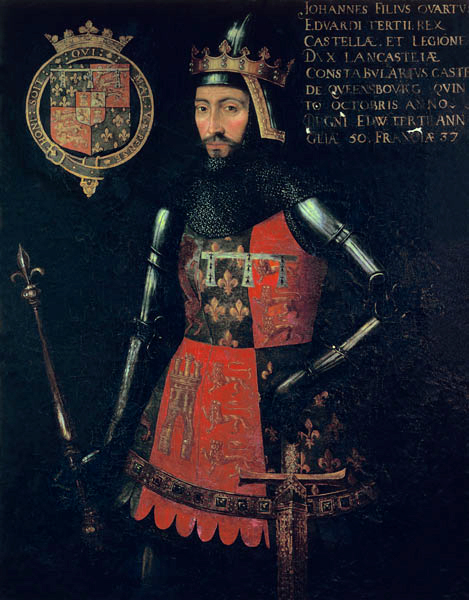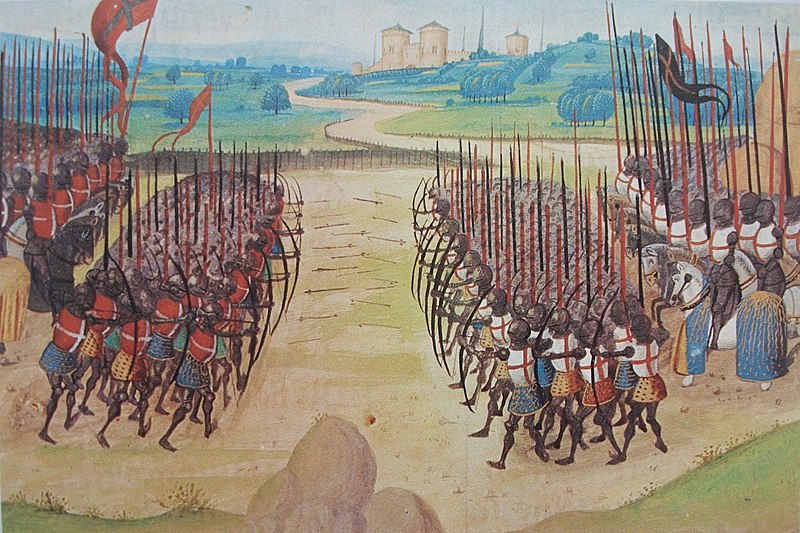_-_Lissabon_Museu_Nacional_de_Arte_Antiga_19-10-2010_16-12-61.jpg/461px-Anoniem_-_Koning_Johan_I_van_Portugal_(1450-1500)_-_Lissabon_Museu_Nacional_de_Arte_Antiga_19-10-2010_16-12-61.jpg) |
| John I of Portugal |
The Portuguese-English Alliance
Isabella of Portugal was the only daughter of King John I of Portugal and his wife Philippa of Lancaster[i]. King John gained his throne
following the death, in 1383, of his brother Ferdinand. Ferdinand’s only surviving child,
the ten year old Beatrice, was married to King John of Castile. The Portuguese had no desire to be swallowed up by the
Castilians, whose king was hungry to expand his domains. An interregnum followed the king’s death in October
1383 as the two John’s fought it out.
On 6th
April 1685 the Portuguese Cortes pronounced John, Master of the Order of Aviz[ii], king of Portugal. The Battle of Aljubarrota, fought on 14th August
1385, between the Castilians and the Portuguese, resulted in a resounding
victory for the Portuguese commanded by John and his general Nuno Alvarez Piera. More than 5,000 Castilian soldiers
were killed after the battle. In October the Battle of Valverde merely served to confirm Portuguese
independence from Spain.
 |
| John of Gaunt |
The
following year the newly crowned King John came to the aid of his father-in-law
John of Gaunt, Duke of Lancaster, when he attempted to take the throne of Castile by right
of marriage[iii]. The Duchess of
Lancaster and her daughter followed the army who were unimpressed. According to
Froissart’s Chronicles the men grumbled;
‘What was the Duke of
Lancaster thinking of….when he planned a big campaign yet brought his wife and
daughter with him? It has held us back all to no purpose….As for the campaign
and the capture of towns, cities and castles, the ladies are not much help
there.’[iv]
Eventually
John of Gaunt returned home having lost a large part of his army to sickness.
The Royal Family
Born in Évora, on 17th January 1397, Isabella was one of six children and
the only girl. Her oldest brother Edward was born in 1391, Peter[v] in 1392, Henry[vi] in March 1394, after Isabella came John[vii] born in January 1400[viii]. The last child, of
what was to become known as the Illustrious Generation, was Ferdinand born in September 1402. The children
had an older half-brother Don Alfonso[ix], the result of King John’s liaison
with his mistress Inês Peres.
 |
| Don Alfonso |
Although
John is viewed by historians as not particularly bright he was an effective
leader and a warrior who had a dream of recreating the Arthurian legend in Portugal. His sons were taught to venerate him as
the saviour of Portuguese independence. John used the younger and lower ranking
nobility to counter-balance the power of the older nobles and clergy, something
that was viewed by the old aristocracy with disdain;
‘Another and new world then
arose and a new generation of men; for the sons of people of such low degree
that it would not be fitting to name them were, at that time, made knights for
their good services to the king, and for their courage.’[x]
John also
kept control of the machinery of government solely in his hands.
Philippa was
a contrast to her husband imbued with the spirit of pragmatism. She was in
control of the children’s education and instilled in them a strong religious
faith and the sense of royal duty. Henry was dedicated to biblical and
theological studies[xi] with an interest in
liturgical matters, an interest inherited from his mother.
Philippa
also involved herself in the affairs of the home she left behind her;
intervening with her brother Henry IV, when he usurped the throne from
their cousin Richard II, to help Richard’s followers. She also arranged the
marriage of the Earl
of Arundel[xii]
to marry John’s illegitimate daughter Beatriz[xiii].
An Unusual Childhood
.png/355px-Filipa_de_Lencastre%2C_Rainha_de_Portugal_-_The_Portuguese_Genealogy_(Genealogia_dos_Reis_de_Portugal).png) |
| Philippa of Lancaster |
Isabella was
allowed to play with her older brothers, despite the formalities of the queen’s
nursery. Isabella also helped to look after her younger brothers John and
Ferdinand when they were small. John was to become a private and retiring
person as an adult, while Ferdinand adored his adventurous brother Henry and
dreamed of following in his footsteps.
The children
were tutored to read in several languages including Latin, French, English and
Italian, and were also taught science and mathematics. The royal children’s
education, probably managed by Philippa, was of high quality as evidenced by
their literary writings in adult life. Philippa imbued her children with
admiration for the Plantagenet ancestry. In the spirit of her
parents’ renaissance court Isabella was an avid reader and the siblings all enjoyed
horse riding and hunting.
Edward was
more suited to be a scholar than a king while his brother Charles had a
temperament better suited for ruling; his advice to his brother on delaying
decision making was very sensible;
‘Neither grant nor decide
them [unclarified issues] at once; and those that certainly do not appear bad
and unreasoned , do not deny them, but put them off so as later, with more
repose and less fatigue, to determine them as you ought.’[xiv]
Isabella was
sometimes allowed to join her brothers when they were tutored by their father
in statecraft. Alongside them Isabella was schooled in diplomatic negotiations
and the vagaries of politics, something that was to be of use to her later in
life.
Real Politique
 |
| Walls of Ceuta |
On 19th
June 1415 the eighteen year old Isabella was grief stricken when her mother
Philippa died at the age of fifty three. Philippa caught the plague and died at
Sacavém after bidding her children farewell.
Her three older boys, about to be knighted, were presented with jewelled swords
by the queen. John, whose marriage to Philippa had been based on the alliance
with England, had grown quite fond of his wife and was;
‘So grieved by [her] mortal
illness… that he could neither eat nor sleep.’[xv]
Mother and
daughter had a close and affectionate relationship and after Philippa’s death
Isabella withdrew from the world for a while. She spent her time with her
ladies-in-waiting, keeping herself amused with needlework, singing and
indulging her passion for reading.
Six days
after their mother’s death the princes joined their father who led a fleet to
north Africa in an attack on the port of Ceuta[xvi]. Philippa had coordinated the
expedition. The battle of Ceuta in August resulted in the Portuguese
taking the town, their first foothold in what was to become their empire in
Africa. Edward was placed in charge of the town which was to become a drain on
the Portuguese treasury[xvii].
 |
| Battle of Agincourt |
Nine days
before King John and his sons' attack on Ceuta, a momentous event was happening
in the English Channel as Henry V led an army across to France to press his somewhat nebulous
claims to the French throne. It did not take long for him to cut a swathe
through France and by October had sealed his bid with victory at the battle of Agincourt[xviii].
This victory
was to overturn the status quo; the Hundred Years War had been stagnating for some time,
but Henry’s audacious feat was the start of the English domination of the last
stages of the war.
Following
the victory in France and with dreams of further military glories yet to come
Henry V, hoping to create an anti-French alliance, looked to Portugal for a
wife. Isabella received an offer of marriage from her maternal cousin of
England. The Portuguese and English had been allies in trade for a long time
and Henry’s grandfather had helped King John gain his kingdom. John’s marriage
to Philippa had helped strengthen the ties between the two countries, but the
negotiations failed.
Bibliography
The
Fifteenth Century – Margaret Aston, WW Norton and Company 1979
The Hundred
Years War – Alfred Burne, Folio Society 2005
Chronicles –
Froissart, Penguin Books 1968
The Reign of
Henry VI – RA Griffiths, Sutton Publishing Ltd 1998
Agincourt –
Christopher Hibbert, Pan Books 1964
The
Fifteenth Century – EF Jacob, Oxford University Press 1997
Prince Henry
– Peter Russell, Yale University Press 2000
Isabel of
Burgundy – Aline S Taylor, Madison Books 2001
www.wikipedia.en
[ii]
A chivalric order
[iv]
Chronicles - Froissart
[vi]
One of Portugal’s most famous sons, Duke of Viseu, he became known as Henry
the Navigator and is regarded as the main force behind the Age of Discoveries
[viii]
Two children, possibly girls, died at birth in the years between Isabella’s
birth and the birth of Prince John
[x]
Prince Henry - Russell
[xii]
One of her brother’s principal supporters
[xiii]
Born in 1386, Beatriz was the
youngest child of John’s relationship with Inês Perez
[xiv]
Isabel of Burgundy - Taylor
[xvi]
The town was part of the Kingdom
of Fez captured from the Hafsids with the
assistance of the King of Aragon
[xvii]
It was later decided that the port of Tangiers was essential for
their expansionist plans but the city was not taken until 1471. Tangiers was
handed over to England in 1662 as part of the dowry of Catherine of
Braganza when she married Charles II
I believe the name Nuno has a wiggly thing on the second n, making it Nunyo.
ReplyDeleteIt sounds as though she had a good childhood, which I hope made up for being royal.